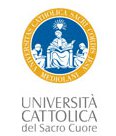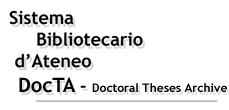|
|
DocTA - Doctoral Theses Archive >
Tesi di dottorato >
CORSO DI DOTTORATO IN SCIENZE DELLA PERSONA E DELLA FORMAZIONE >
Citazione:
Utilizza queste indicazioni per citare o creare un link a questo documento.
|
Amighetti, Paolo Maria. "FEDELTA' ITINERANTI. RETI POLITICHE DELLA NOBILTA' BRESCIANATRA VENEZIA, MANTOVA, LA SPAGNA E L'IMPERO (SECC. XVI-XVII)", Università Cattolica del Sacro Cuore, XXXV ciclo, a.a. 2021/22, Milano, [http://hdl.handle.net/10280/145458].
|
| Titolo: | FEDELTA' ITINERANTI. RETI POLITICHE DELLA NOBILTA' BRESCIANATRA VENEZIA, MANTOVA, LA SPAGNA E L'IMPERO (SECC. XVI-XVII) |
| Autore/i: | AMIGHETTI, PAOLO MARIA |
| Tutor: | CREMONINI, CINZIA |
| Coordinatore: | MARCHETTI, ANTONELLA |
| Lingua: | ITA |
| Abstract in italiano della tesi: | La tesi ricostruisce le strategie di affermazione politica di alcune delle principali famiglie della nobiltà bresciana (Avogadro, Gambara, Martinengo) tra la fine del Cinquecento e i primi decenni del Seicento. Benché queste famiglie detentrici di feudi fossero radicate nel Bresciano e costituissero l’élite della società locale, i loro esponenti cercarono sempre di stringere rapporti politici con corti e principi esterni alla Repubblica di Venezia, di cui Brescia faceva parte. Delineati i caratteri dell’ambiguo rapporto tra i feudatari bresciani e Venezia, la tesi si focalizza sui rapporti politici e diplomatici di questa nobiltà con l’area gonzaghesca, la corte imperiale e quella spagnola. Sono quindi ricostruite alcune carriere diplomatiche e militari di bresciani al servizio del duca di Mantova Vincenzo Gonzaga (1587-1612) e dell’imperatore Ferdinando II d’Asburgo (1619-1637). La documentazione impiegata proviene in gran parte dagli archivi di Venezia, Mantova, Brescia e Simancas e da archivi di famiglia. La bibliografia di riferimento include la storiografia sulla feudalità in età moderna, sulle élites transnazionali e sulla corte in Europa. |
| Abstract in inglese: | This thesis deals with the political strategies of some of the main noble families of Brescia (Avogadro, Gambara and Martinengo) between the last decades of the 16th and the beginning of the 17th century. These families ruled over fiefs in the countryside and were strongly rooted in their province, thus belonging to the social élite of Brescia. Despite this, they were eager to serve rulers and enter courts outside the Venetian Republic, to which their city belonged. After a detailed overview on their ambiguous relationship with their natural ruler (i.e., Venice), the thesis focuses on these nobles’ political and diplomatic relationship with the Gonzaga and with the Imperial and Spanish Habsburg courts. In particular, my attention focuses on some Brescian nobles who served the Duke of Mantua, Vincenzo I Gonzaga (1587-1512), and the Holy Roman Emperor Ferdinand II (1619-1637). The research is based on sources from different archives, such as the State Archives of Venice, Mantua and Brescia, from the Archivo General de Simancas (Spain) and from some family archives. Bibliography includes scholarship on early modern feudality, transnational élites and European courts. |
| Data di discussione: | 22-mag-2023 |
| URI: | http://hdl.handle.net/10280/145458 |
| È visualizzato nelle collezioni: | FACOLTA' DI SCIENZE DELLA FORMAZIONE
CORSO DI DOTTORATO IN SCIENZE DELLA PERSONA E DELLA FORMAZIONE
|
File in questo documento:
| File |
Descrizione |
Dimensioni | Formato | Accessibilità |
|---|
| Amighetti_Tesi_def_c.pdf | tesi completa | 2,4 MB | Adobe PDF | non consultabile
|
| tesi_frontespizio+indice.pdf | frontespizio + indice | 661,78 kB | Adobe PDF | Visualizza/apri
|
|
Accesso e utilizzo dei contenuti di DocTA
|



